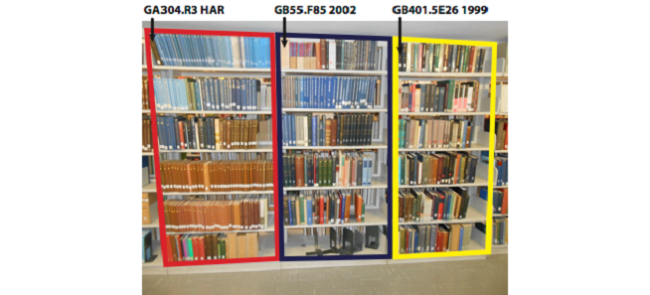
Researchers Simon Robinson, Jennifer Pearson, and Matt Jones of the Future Interaction Technology Lab at Swansea University in Wales have devised a navigation method that uses barcodes and library call numbers to initiate indoor navigation.
Just you wait and see; once RF tags and Internet-of-Things permeate everything, enterprising engineers will expand the indoor navigation scheme to encompass every other location, and pretty soon, we’ll have an entire generation of slack-jawed youths so dependent on smartphones that they’ll be unable to walk otherwise. Then it’ll be your turn to shake your finger and go on about “back in my day…”
But who am I kidding, people already use GPS apps like Google maps to navigate city streets in search of specific restaurants or other tucked away shops ─ I would know, I’m one of them! I have no issues navigating my hometown of NYC, but sometimes, Google maps can give me just the right amount of “oomph” to shave off 10 minutes of uselessly walking around in circles trying to orientate myself. The idea put forward by the Swansea researchers reinforces that: it saves time, but in the context of a university library.

It’s brilliant really. All you have to do is search for your book in the BookMark app (available to Android-owning students of Swansea University), and then scan any nearby book’s barcode or call number, and the app will automatically plot a course to the desired bookshelf; navigating arcane corridors has never been easier. The only manual action left for you to do is to locate the book on the shelf
“Wait…what? Why is this necessary you ask?” Because libraries are massive labyrinths organized by a standardized cataloguing system with a high level of granular data, and as a result, mirror would-be systems organized by RFID tags. In other words, the principle of the technology can be adapted for outside mediums such as airports and supermarkets.

Cataloguing every food produce with an RFID tag is very burdensome and presently impractical; however, separating items into product zones, similar to Swansea’s app leading students to the bookshelf, requires minimal effort on behalf of the supermarket but still saves ample walking time. Convenient, yes, but over convenience runs the risk of dependency, and before we know it we’ll have an entire generation of people shuffling along with permanent downcast faces, bleating as go on their merry way.
Advertisement
Learn more about Electronic Products Magazine





